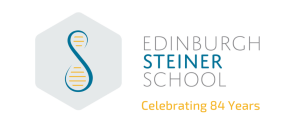Comprehensiveness. Creativity. Community: Investing In Our Whole Child’s Future
October 31 2023
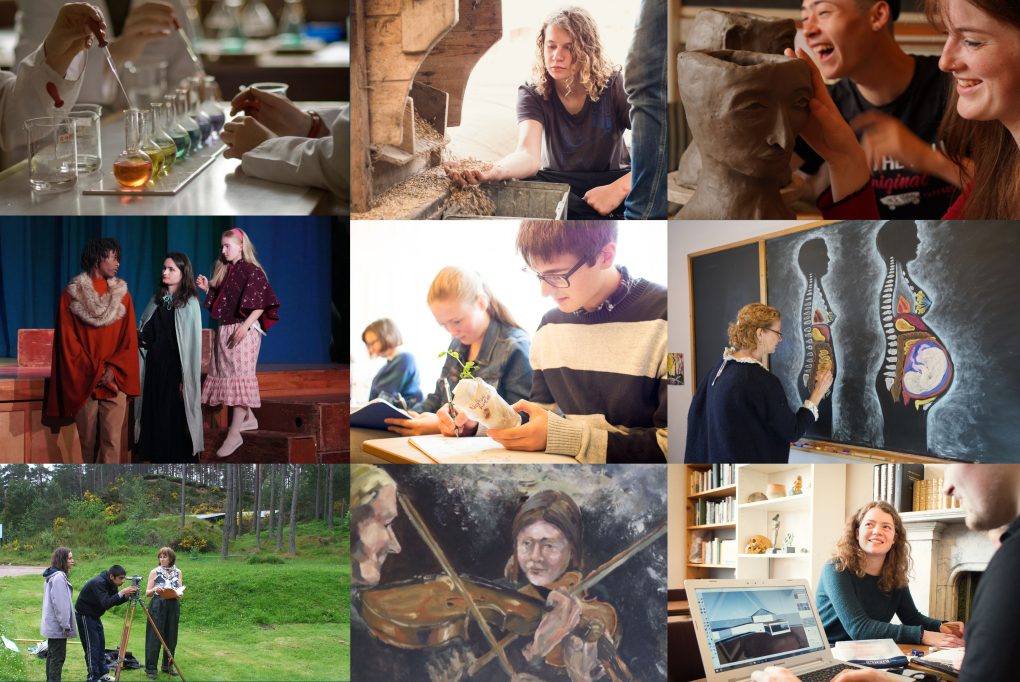
At a time where most young people become specialised as a result of their exam choices, pupils at ESS continue to study a broad spectrum of sciences, humanities & arts in addition to national exams. You are invited to An Evening on the Upper School, 14th November, 7.30pm in the School Hall.
On Tuesday 14th November, ESS is hosting an evening on the Upper School in the School Hall at 7.30pm. Whilst this will be of particular interest to families from Clases 6 – 9, this event is open to any parent, carer or pupil with an interest in understanding more about what lies ahead in Classes 9 – 12.
Interim Head of School, Nick Brett, will provide an overview of a pupil’s future following the transition from the Lower School. Alistair Pugh and Hester Machin will be speaking about Integrated Education, a unique form of assessment available at ESS from Class 8. Michael Hooper will share his experience of teaching the sciences – as a Main Lesson, a weekly subject block in Class 10 and at exam level, in a Steiner Waldorf school. Advanced Higher Art Teacher, Penny Reid, is the fourth keynote speaker, who will address the rigor of examinations at this level. Student representitives from the Upper School will also be doing a Q&A.
EDUCATION IN SCOTLAND
There is a growing need for creative solutions to meet an ever-increasing array of social, political, economic and natural challenges, from disaffected youth to climate change, and yet there are fewer and fewer opportunities for young people to practise the necessary skillset they will need within the current assessment system. Employers, universities and global leaders in creativity are calling for the education sector to make an investment of effort now, so that pupils will have the inner tools that they need to meet these modern challenges.
The independent sector in the Capital educates around 1 in 10 primary children, increasing to 1 in 5 in secondary school according to figures collected before covid (source), compared to a UK average of 5.9% of all children. One way ESS is meeting this neccessity in the sector is through its enrolment process. As a co-ed, non-denominational educational organisation, we are the most financially assessible tuition fee-paying school; and one of the few who doesn’t select pupils on the basis of ‘academic ability’. Distinctively, there is no enrolment test that will determine whether our School is a good fit. While education has a duty to prepare young people for the world, and to help them develop skills and knowledge, we believe our most important purpose is to instil a sense of principled agency: education from our standpoint is rooted in an understanding of what it means to be human; how and why human beings are connected to each other and the natural world, and what it means to be a responsible individual in a wider community.
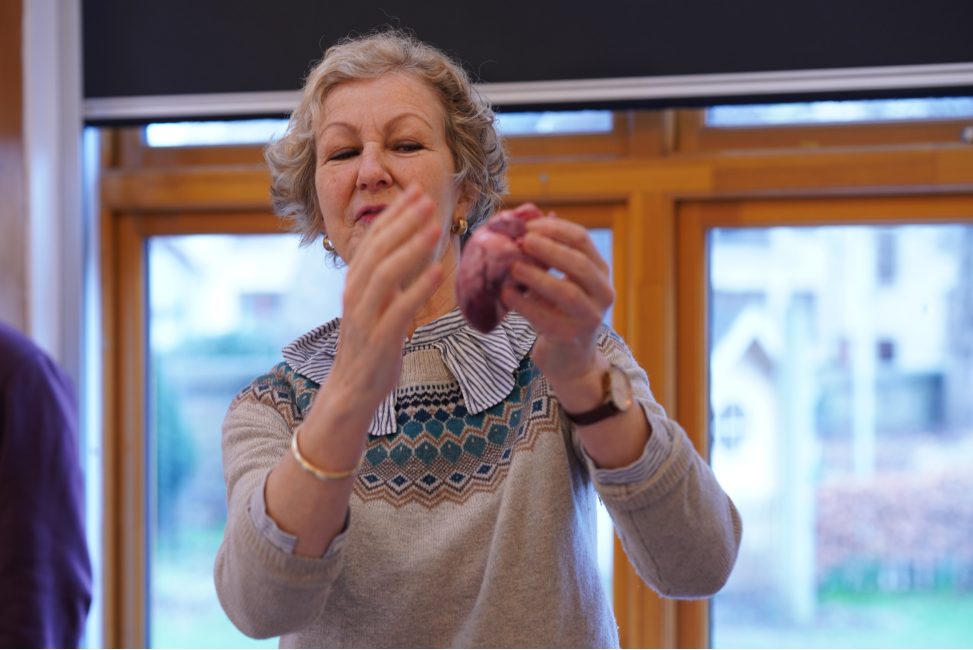
“The increasingly complicated world around us calls for clear-headed and self-reliant people, who do not feel they need to adopt every aspect of the modern chaotic world around them in order to be valued and contributing human beings. The Steiner School provides pupils with this independent view.”
Renske Brune, Main Lessons: Human Biology (Class 9) / Botany (Class 11)
CRISIS IN EDUCATION
We share the view that assessment by exams does not necessarily give an accurate or complete picture of pupils’ achievements and abilities, mitigating Scottish education’s heavy reliance on this approach through being a centre for Integrated Education, with the Main Lesson Programme continuing to be a distinctive feature that sets Steiner Waldorf schools apart from other educational institutions.
INTEGRATED EDUCATION
ESS pupils aged 13-14 are currently underway with their Independent Projects, which draws on formal, non-formal and informal learning and any area of the taught curriculum.
These projects are the backbone of the IE Award – a standalone qualification that can double as the first module of the IE Certificate offered from Class 9. They are a whole year younger than the specified age for this qualification and level of study, such is their capacity for focused, self-directed activity.
As exam reforms such as scrapping Nat 5s continue to be debated by the Scottish Government, this innovative suite of portfolio-based qualifications is an established solution that is in harmony with an holistic approach to education.
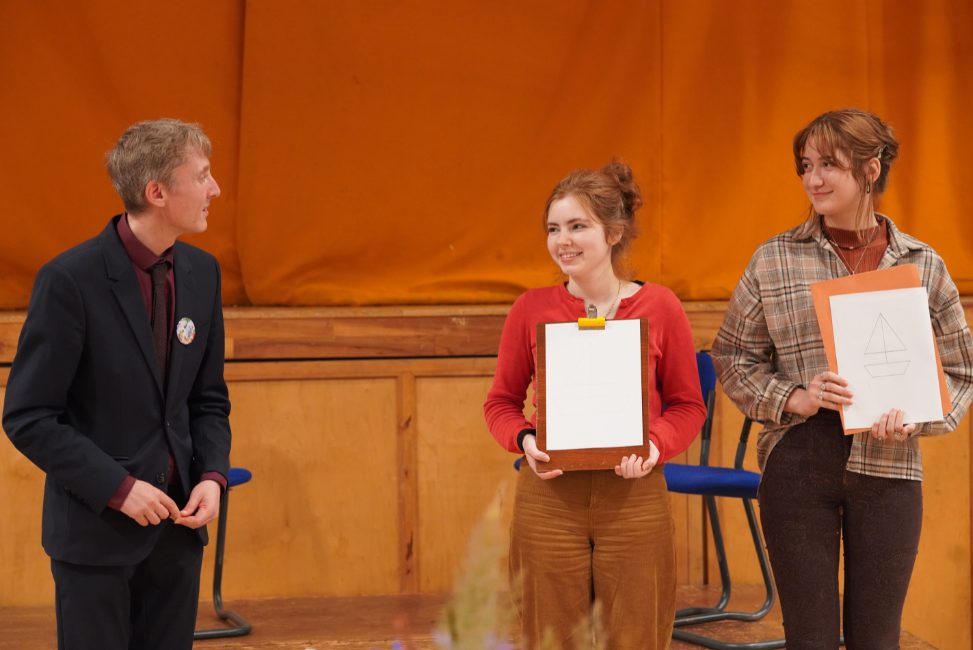
Transformative thinking begins with questions, not answers. And that’s where the traditional exam model has gone wrong: it shepherds learners towards specific answers. Open questions, on the other, are playful.”
Alistair Pugh writes as a contributor to the recently published Play And Health in Childhood titled ‘Playful participation in curriculum design’ (pages 135 – 139). Alistair is the long-standing SQA Coordinator, with 22 years at the chalkface as the Upper School Geography Teacher. He teaches the Main Lessons: Geoloy (Class 9) / Climatology (Class 10) / Surveying (Class 11) / World Geography (Class 12). He has been involved in the development of Integrated Education since its inception in 2015.
Classes 11 and 12 have the option of pursuing further modules alongside their National Courses.
The first Steiner Waldorf graduate of the succeeding IE Diploma at Level 3 (A-level/Scottish Higher equivalent), which is geared towards ages 16 – 18, has this year been accepted by Edinburgh’s Napier University on the merits of the standalone qualification.
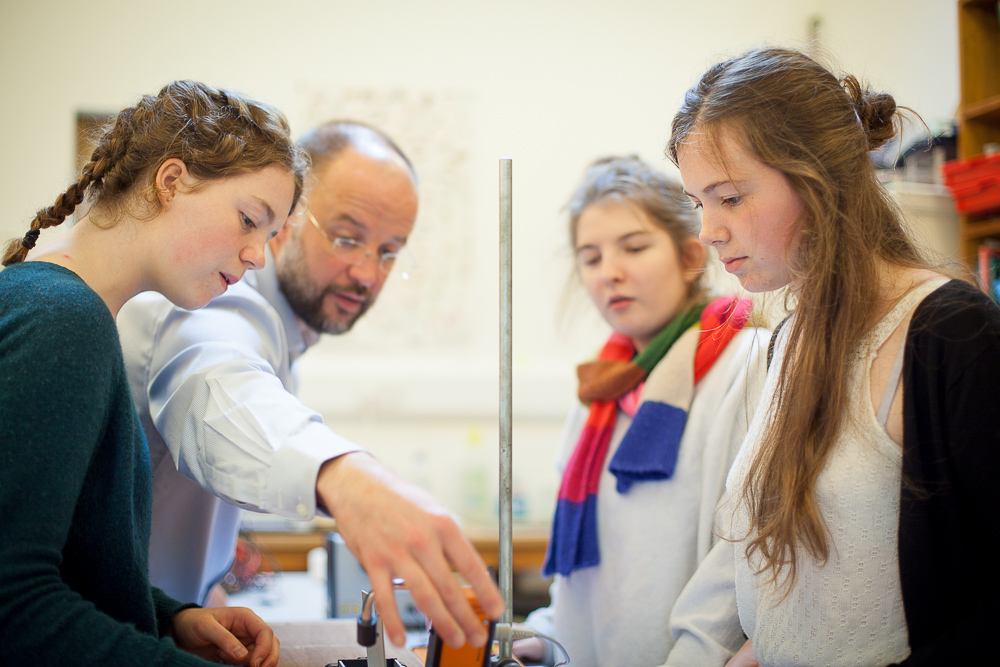
Steiner pupils develop a remarkably strong sense of personal identity and an acceptance of who they are which means that they approach the world with confidence and with great inner stability. It still amazes me how good the pupils are at speaking to adults. Having taught science in mainstream schools, the big difference in teaching science to Steiner pupils is that they are outward looking. They have genuine curiosity about the world around them, a real hunger for knowledge and their flexibility of thinking allows them to play with ideas they meet. Teaching science to Steiner pupils is great fun.”
Mike Hooper, Teacher of Physics Exam Level National 4/5 and Highers / Main Lessons: Physics (Class 9) / Embryology / Mechanics (Class 10), as well as Class 10’s weekly Science Lesson.
EXAMS
In spite of the School having no entrance test, and a policy that permits pupils to enter for an exam choice on the basis of interest not ability, including Biology, Physics, Chemistry, Maths, German, French, History, Geography, Drama and English, exam results were very strong in 2023, with particularly successful performances in the departments of English, sciences and languages. Half of all Higher level exam entries (48%) were grade ‘A’ while the combined percentage of ‘A’ and ‘B’ grade results was 71%, compared to the national picture of 32.8% and 56.9% respectively. Furthermore, the number of exam choices offered aims to allow the most latitude for study, including the possibility of extending the Advanced Highers diet.
Qualifications, Exams & Carrers Handbook (2023)
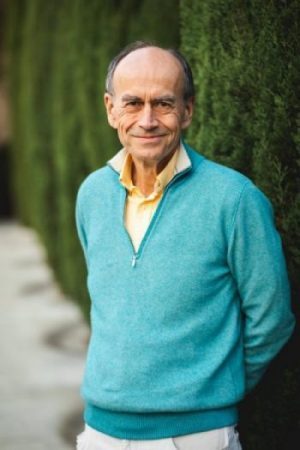
Training in the Arts, especially classical music but also painting and writing, trains the mind because it teaches a person that one cannot be creative and innovative if one doesn’t first master a skill. Creativity comes on top of technical ability”
Nobel Laureate in Medicine (Neuroscience), Waldorf graduate and bassoon player, Professor Thomas Sudhof, in an interview with ESS in his capacity as Patron of the Acknowledging Creativing Thinking Skills (ACTS) project, from which the Integrated Education qualifications derived.
One of the recurrent aspects that draw families to a Waldorf education is its breadth, carefully designed to align with the developmental stage of the pupils, through its delivery seeking to addresses all the multiple intelligences in the young person so that the foundations may be laid for mental adaptability, initiative and moral strength in adult life.
Nowhere is this more evident than in Classes 8 to 12. At a time where most young people become specialised as a result of their exam choices, pupils at Edinburgh Steiner School continue to study a broad spectrum of sciences, arts and humanities in addition to their national exam subjects. They are able to do so because the timetable ring-fences up to two hours each morning for the Main Lesson, when pupils are most alert and receptive.
Delving deeply into a subject for a period of two to four weeks, this intensive approach allows pupils to fully immerse in a topic, fostering a deep understanding and connection to the subject matter; and become well-travelled in what can be a daunting journey from naivety to wisdom.
A Main Lesson is not restricted to acquiring knowledge. It is also about developing critical thinking skills and fostering a curiosity for the learning process. Pupils are encouraged to think deeply, ask questions, make connections between different subjects. The Main Lesson book offers aesthetic expression of their understanding, whilst each morning block incorporates hands-on engagement of the subject through experiments or practical work.
Importantly, this cornerstone part of the Waldorf curriculum is non-exam based, though several Main Lessons are suitable for pupils to meet the requirements of the Creative Thinking Skills module of the Integrated Education Certificate.
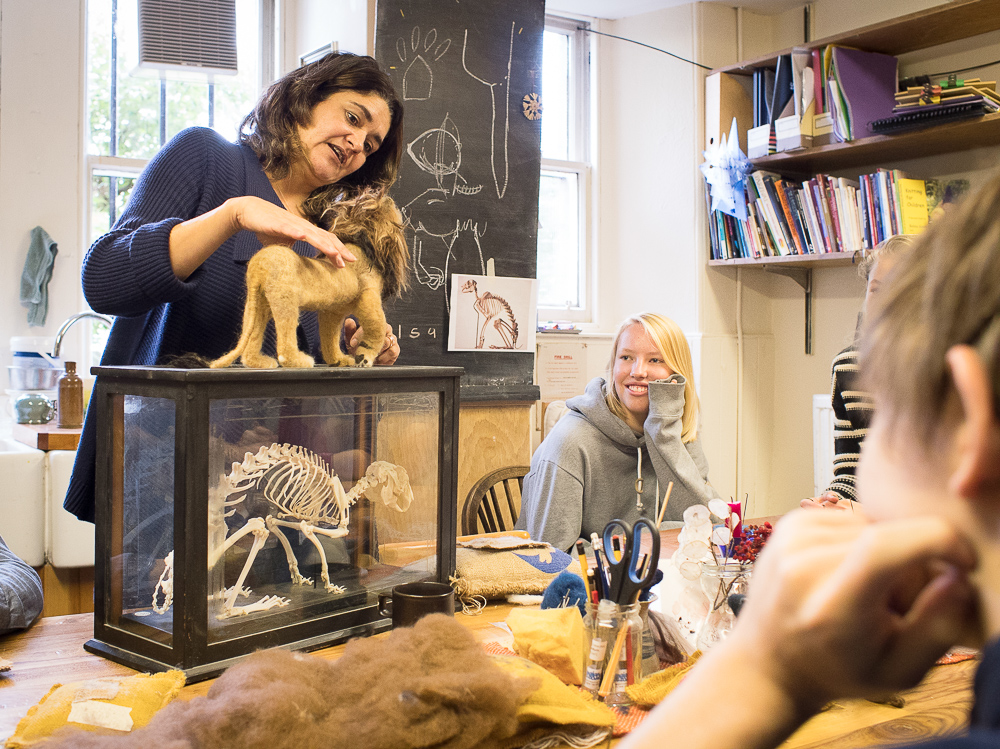
In this digital era, where the landscape of work is evolving rapidly, it’s imperative to equip our children with the resilience and adaptability they need to navigate the uncertainties of the coming decade. At ESS, we recognise that we are living in a golden age of entrepreneurship, where it’s possible to create prosperous businesses with minimal initial investment. Our mission is to provide our pupils with a foundational understanding of the entrepreneurial process, fostering a spirit of innovation and self-reliance, ensuring they are well-prepared to seize the opportunities of tomorrow.”
Madame Rachel Craig, Crafts Subject Teacher, Main Lessos: Felting (Class 10) / Architecture (Class 12)
A distinctive aspect of the Main Lesson in both the Lower and Upper School is storytelling, drawing on the direct oral tradition to forge closer, more emotional bonds between the speaker and the listener than would be achieved by reading to them off the page. With autonomy in their subject that does not rely on a syllabus which lists specific bullet points of knowledge, the teacher can respond to the Class cohort in front of them, often beginning with a captivating narrative or thought-provoking question, encouraging pupils to actively participate through discussion, presentation, debate. This interactive approach helps to develop communication skills, confidence and a sense of community within the classroom; which brings together the whole Class at the start of each day, before dispersing into smaller exam subject classes.
The Programme is not limited to traditionally academic subjects; it also includes lessons on character development, social skills and ethical values. Pupils are encouraged to develop a sense of responsibility, empathy and respect for themselves, others and the environment. Interim Head of School, Nick Brett, in his recent letter to the school community, mentions the the virtues of one such Main Lesson, namely Parsival.
As a result, irrespective of whether pupils veer towards the arts or the sciences in their exam choices, their emerging capacity for analytical thought continues to receive a valuable grounding across all subjects, whilst actively encouraged to exercise independent judgement, be it aesthetic, moral or intellectual. Furthermore, a curiosity for learning itself is cultivated by uniting the faculties of thought, feeling and action.
The Main Lesson Programme is a testament to the holistic and child-centred approach of Waldorf education. This intensive and immersive learning experience can not only contribute to an innovative qualification, it sets the stage for the whole day’s learning.
Read the full Tuesday Notice here: Edinburgh Steiner School’s weekly ezine
News pieces:
School calendar dates
Helping Children Settle Into Deeper Sleep
Author Visits Classes 4 – 8 Tomorrow
Christmas Market Bulletin
Bonfire Night Fundraiser Cancelled
Comprehensiveness. Creativity. Community: Investing In Our Whole Child’s Future
Adverts from school community
